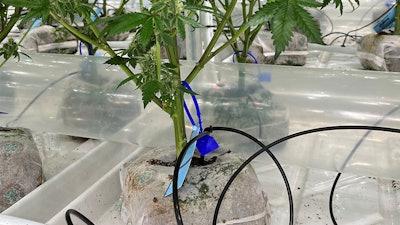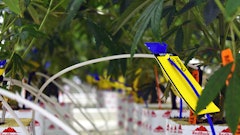
The Colorado Marijuana Enforcement Division (MED) issued a press release Dec. 11 to clarify plant and package tagging compliance requirements in the agency’s recently adopted rule revisions, set to take effect Jan. 8, 2024.
There are several tracked updates in the 270-page document, but one strikethrough that caught the attention of businesses in the state—and media outlets—was the removal of “RFID tag” when describing plants and packaging required to have Radio-Frequency Identification tags for compliance and seed-to-sale tracking purposes. The new rules state that plants instead must have an “Inventory Tracking System” tag, which many interpreted to mean that RFID technology was no longer required in tags.
Some thought that it also might mean a potentially less expensive solution would be available if the tag no longer required the RFID technology. MED published the release to “correct inaccuracies” that had been reported and explained the change would not impact current policies.
“While newly adopted rules removed the reference to ‘RFID’ and replaced it with a general reference to ‘inventory tracking system’ language, these changes do not eliminate requirements for licensees to use inventory tracking tags in January 2024,” MED stated in the press release. “Rather, this rule change is in anticipation of the Department’s next solicitation process for the statewide inventory tracking system and specifically allows for broader consideration of options beyond the RFID-based technology that has been historically required.”
MED currently contracts with Metrc, which provides track-and-trace software for many state-legal cannabis programs, and the contract in Colorado expires in 2026. According to Metrc’s website, the state has used Metrc technology since 2011, and it was “custom built to meet Colorado’s rules and regulations leading up to the historic launch of the first adult-use cannabis market in the United States” in 2014. That included original rules specifying RFID technology is used.
As was the case before the revised rules were adopted Nov. 9, packages and each individual plant must have a Metrc tag, which run an average of 45 cents per tag.
“… Any changes to RFID-tag requirements will only occur after the MED concludes the procurement process for the state’s inventory tracking system,” according to the press release. “The Department’s preparation for this open, competitive solicitation process has been initiated and will continue throughout 2024.”
Additionally, Metrc released a statement that the recent rule change “does not alter Metrc's service offering or our current obligation to the state in accordance with our contract. Our system is configured to work optimally with RFID tags, and as such, we will currently maintain an RFID tag solution for plant and package tracking. As industry needs evolve, we consistently evaluate alternative options to best service all stakeholders (for example, we are currently piloting a new iteration of a more sustainable tag, among other offerings). Metrc will continue to partner with the state agency and adapt alongside the Colorado industry to ensure regulatory compliance needs are met for all parties.”
According to Metrc’s website, RFID technology enables regulators to “perform site inspections, audits, and investigations in a fraction of the time required by other line-of-sight scanning technologies.” It also can be an efficient inventory tracking system for cultivators and producers.
“The pricing on a per plant or per package basis is not particularly dependent on whether RFID is included in a tag or not,” said Metrc CEO Michael Johnson in a statement provided to Cannabis Business Times. “We care a lot about supporting a market that is viable, safe, and thriving."
Jonathan Spadafora, president of Denver-based cultivation company Veritas Fine Cannabis, said the RFID technology is unnecessary and tags are costly when you consider that growers in the state are cultivating thousands of plants at a time.
“The theory was that if the state wanted to understand where our plants were and if our Metrc was accurate, they had the ability to come into the facility and wave the RFID tracker … but it's never happened once,” Spadafora told CBT in October when the rule revisions were proposed but not yet final. “So from the very beginning, that's just a baked in cost for us, that every single plant, once we take clones and put it into dirt in veg, has to have the plant tag. And those plant tags that we use are much more expensive because they have an RFID component to it.”
Spadafora continued, saying not having the RFID requirement “will allow us to stop overspending on a component that's never used and to substitute with a tag that does all the work of everything that's ever been asked of it, but doesn't have this capability of going to the moon with no intention of ever going to the moon. It's kind of how it feels.”
The 45 cents per tag cost does not include the labor involved in placing them on individual plants, Spadafora said, noting a batching system might be another less expensive solution for cultivators in the future.
MED said it will explore alternatives to RFID technology, and the new rule language gives them flexibility to consider more vendors.
“Through this update … our options will no longer be limited to vendors that couple their inventory tracking systems with RFID technology,” Dominique Mendiola, senior director of MED, said in the press release. “Inventory tracking with RFID-tags has been a requirement since the inception of Colorado’s adult-use program, and we want to ensure regulations evolve where opportunities exist. With one of the most mature adult-use cannabis markets in the nation, this is a critical opportunity to reflect on what we have learned and how our regulatory needs could still be met by the variety of inventory tracking solutions available today.”

























